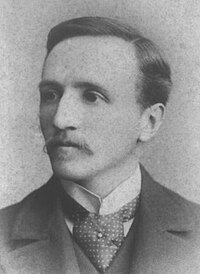Robert George Windsor-Clive, 1st Earl of Plymouth
|
The Right Honourable The Earl of Plymouth GBE CB PC |
|
|---|---|
 |
|
| Paymaster General | |
|
In office December 1890 – 11 August 1892 |
|
| Monarch | Queen Victoria |
| Prime Minister | The Marquess of Salisbury |
| Preceded by | The Earl of Jersey |
| Succeeded by | Charles Seale-Hayne |
| First Commissioner of Works | |
|
In office 11 August 1902 – 4 December 1905 |
|
| Monarch | Edward VII |
| Prime Minister | Arthur Balfour |
| Preceded by | Aretas Akers-Douglas |
| Succeeded by | Lewis Vernon Harcourt |
| Personal details | |
| Born | 27 August 1857 |
| Died | 6 March 1923 (aged 65) |
| Nationality | British |
| Political party | Conservative |
| Spouse(s) | Alberta Paget (1863-1944) |
Robert George Windsor-Clive, 1st Earl of Plymouth GBE CB PC (27 August 1857 – 6 March 1923), known as The Lord Windsor between 1869 and 1905, was a British nobleman and Conservative politician. He was the founding President of the London Society.
Plymouth was born at John Street, Berkeley Square, London, the son of the Hon. Robert Windsor-Clive, son of the Hon. Robert Clive and Harriett, 13th Baroness Windsor, daughter of Other Windsor, 5th Earl of Plymouth. His mother was Lady Mary Selina Louisa, daughter of George Bridgeman, 2nd Earl of Bradford. In 1869 he succeeded his grandmother in the barony of Windsor. He was educated at Eton College and admitted to St John's College, Cambridge in 1875. He graduated B.A. in 1878, M.A. in 1891, and was awarded an honorary LL.D by the university in 1900.
As Lord Windsor he commissioned Bodley and Garner to build a new country house at his estate in Hewell Grange near Tardebigge, Worcestershire, which was completed in 1884–1891. The estate had been a seat of the Windsor family since the 16th century. (His family tie to The Windsors was via his paternal grandmother. He was not a Windsor by birth, but a Clive by his father. His grandmother put a hyphen in her name upon her marriage and her son carried it on, but putting a hyphen in your name does not change the male line you descend from.) There are several ruins of earlier houses on the estate, and a large number of listed buildings, structures and statues.
...
Wikipedia
